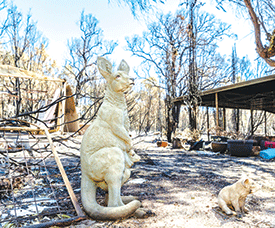Australia feels heat on climate challenge
AUSTRALIA (China Daily/ANN) -- Australia faces a challenging future and confronts the possibility of the catastrophic bushfires that ravaged many parts of the continent last summer and the devastating floods this March along the eastern seaboard becoming the norm.
These are not just wild estimates but the collected opinions of some of the country’s leading scientists in a report issued by the Australian Academy of Science on March 30.
 |
| FA statue of a kangaroo is seen outside a house destroyed by a bushfire on Dinsdale Road, Gidgegannup in Perth, Australia. --Photo agencies |
In the report, titled “The risks to Australia of a 3°C warmer world”, scientists said Australia, as the driest inhabited continent, is “highly vulnerable to the impacts of global warming”.
“Multiple lines of evidence show that the incidence of extreme weather events will increase as the planet warms,” it said.
“Such events are a natural feature of the climate system, but there is strong evidence that many of them, such as heatwaves, bushfires, storms and coastal flooding, have become more frequent and intense in recent times.
“The argument that Australia doesn’t contribute ‘significantly’ to the greenhouse gas emission problem and therefore should not act on climate change ignores the enormous losses that Australia will experience if it doesn’t work with the rest of the world to achieve and exceed the Paris Agreement goals.”
Over the past five years about half of hard coral cover in the shallow waters of the Great Barrier Reef, the world’s biggest coral reef complex, off Australia’s northeastern coast, has been lost due to global warming.
Scientists have estimated that an 80 centimetre rise in global sea levels would drown most of Australia’s low-lying coastal areas, with crop yields falling between 5 percent and 50 percent. Sydney and Melbourne can expect extreme heatwaves, with temperatures reaching 50 C. Ove Hoegh-Guldberg of Queensland University and Lesley Hughes of Macquarie University in New South Wales, two professors who co-authored the report, said “this is not an imaginary future dystopia”.
“It’s a scientific projection based on our (Australia’s) current emissions trajectory a vision of Australia we must both strenuously try to avoid, but also prepare for,” they said, according to a report on the news website The Conversation.
(Latest Update April 12, 2021) |